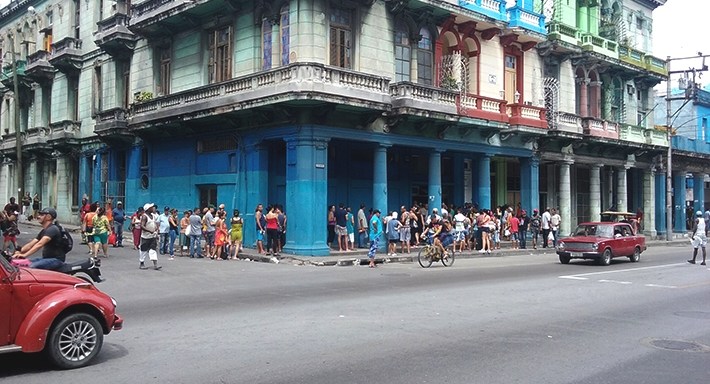 Long lines to buy bread can be found all over Havana. (Photo Alejandro García)
Long lines to buy bread can be found all over Havana. (Photo Alejandro García)
Manna in Havana
HAVANA – I thought they were rumors, people babbling on the street. But in effect the shortage of flour was making itself felt. And then yesterday I heard a woman scream: “Juana, the world’s about to end. There’s no bread.” When I heard this I said to myself: “This is serious.”
The fact that there’s a shortage is nothing new. The surprise factor is what will it be next? Is it matches, eggs, blankets, chocolate … It depends on the season. We have learned to cope with no onions or tomato puree; we know how to live without toilet paper — oh God do we know!; we’ve even accepted that potatoes are a luxury.
However, there are some things that are acceptable, but then there are others… and a lack of bread falls under the latter.
The phenomenon provokes my friend the designer to come up with analogies: “Bread is like the primary colors,” he tells me, “maybe there’s no green, but you must have blue and yellow.”
“Think about the history of mankind,” I answer a bit worried, “fire was discovered, metals, invented the wheel, and then came bread.” First they cooked meat, someone corrects me. True, although it doesn’t help any.
Bread is so basic that there’s no substitute for it.
Back and forth from the neighborhood of Playa to Old Havana, I saw the long lines outside the bakeries. The old saying that everyone exaggerates does not apply here. And then I had terrible thought: family and friends getting off planes with huge bags full of bread, and suddenly there’s a hustle and bustle through the corridors of power all in search of the culprits.
I imagined the headlines written by some of that press they call the enemy rejoicing with the news that there is no bread in Cuba. It’s as simple as: there is no bread. And of course, as it often is, Cuba’s bread, or its absence, will be more relevant than the shooting in France or any Trump tweet.
But wait one second. They’re telling us that the subsidized bread, the one found in stores, will not be lacking. Then you realize that this third world country, which grows no wheat, produces more than 11 million loaves a day to sell at five Cuban cents (a price so ridiculous that it is much less than one cent of a dollar). And then you compare that to the other factor that there’s a whole bunch of people among the 11 million that don’t eat bread, or are on a diet, or prefer, and can afford, to buy the more expensive and better bread.
The fact is, according to the Cuban Office of National Statistic (ONEI), that 814,746 tons of wheat were imported in 2016, at a cost of 214,420 pesos (pesos without surnames, as the ONEI calls them). It is one of the largest purchases in food items along with corn, dairy, rice and meat.
The numbers are important because behind this bread scarcity lie errors in calculations. In other words, there must be a way to spot the problem before running head-on into it.
Just a few months ago in the nightly Round Table TV program, Food Ministry officials explained the “affects” with respect to the production of flour, and mainly in the eastern provinces of the Island. Later in a December 10 Round Table, Minister Iris Quiñones Rojas warned that the situation had become even more dire because it was affecting the entire country.
Taking into account “objective and subjective” issues, she said, there was a significant delay in the acquisition of spare parts for the production mills. As a result, at the beginning of the year, and according to initial estimates, “financial resources not foreseen in the plan to import 30,000 tons of flour” were spent. Therefore, the shortage exceeds 70,000 tons.
However, Minister Quiñones Rojas explained that with the recent arrival of products and the start-up of two production lines, normal conditions will be restored in the coming days.
I go back to my metaphors and their universal symbolism. Paraphrasing the old Roman formula: for the people, bread and circus. Then there is always: Christians asked of their God for “our daily bread;” and one is always “in search of their daily bread.” Of course, if someone is just a plain, old nice person, he or she is “a piece of cake.” I wonder what Pánfilo (Cuba’s most famous TV comedian who makes fun of daily life problems) will say…
Last night, after much searching, I had my eureka moment. I couldn’t help but cry out: “Look! There’s bread!” It made me happy. Until I realized that it was a spurious emotion, the result of a sudden drop in my expectations… One must aspire for much more than bread.
The pack of 10 pieces of bread for a CUC (Cuba’s convertible dollar) now brings only eight. Of course, the black market and inflation are alive and doing well.
My funny friend, the designer, says that the flour was stored in the trunks of the old cars that circulate in Cuba that now have also disappeared (Read Havana’s unanswered transportation problems). We laughed — thank God for that. Without that instant burst of happiness fading, I suddenly remember an old popular TV show where Professor Espinosa would say: “Don’t laugh, this is serious.”

